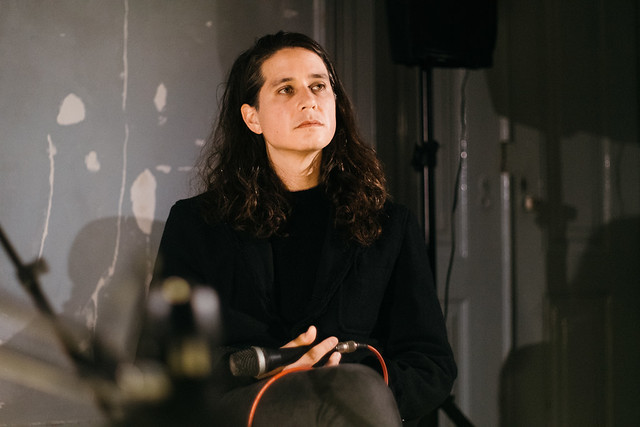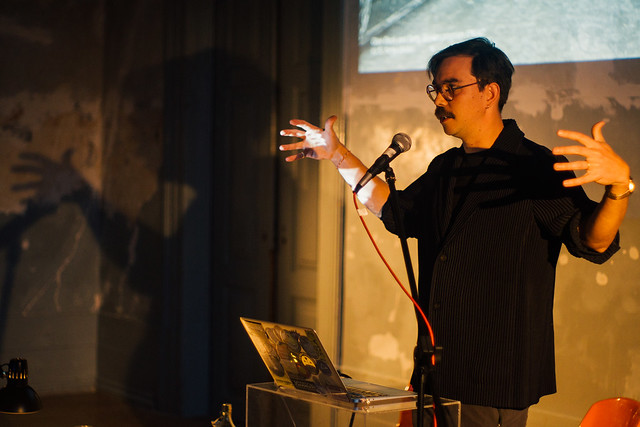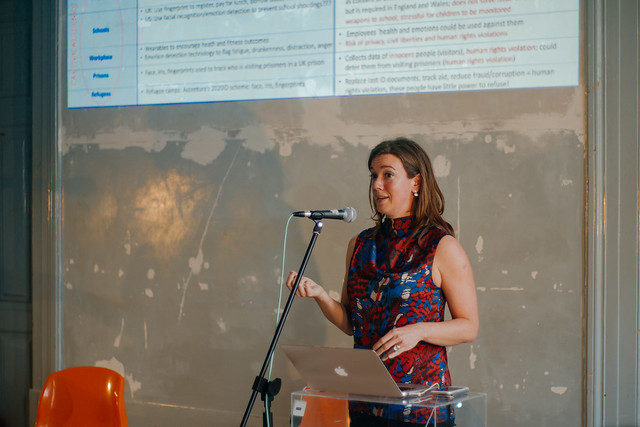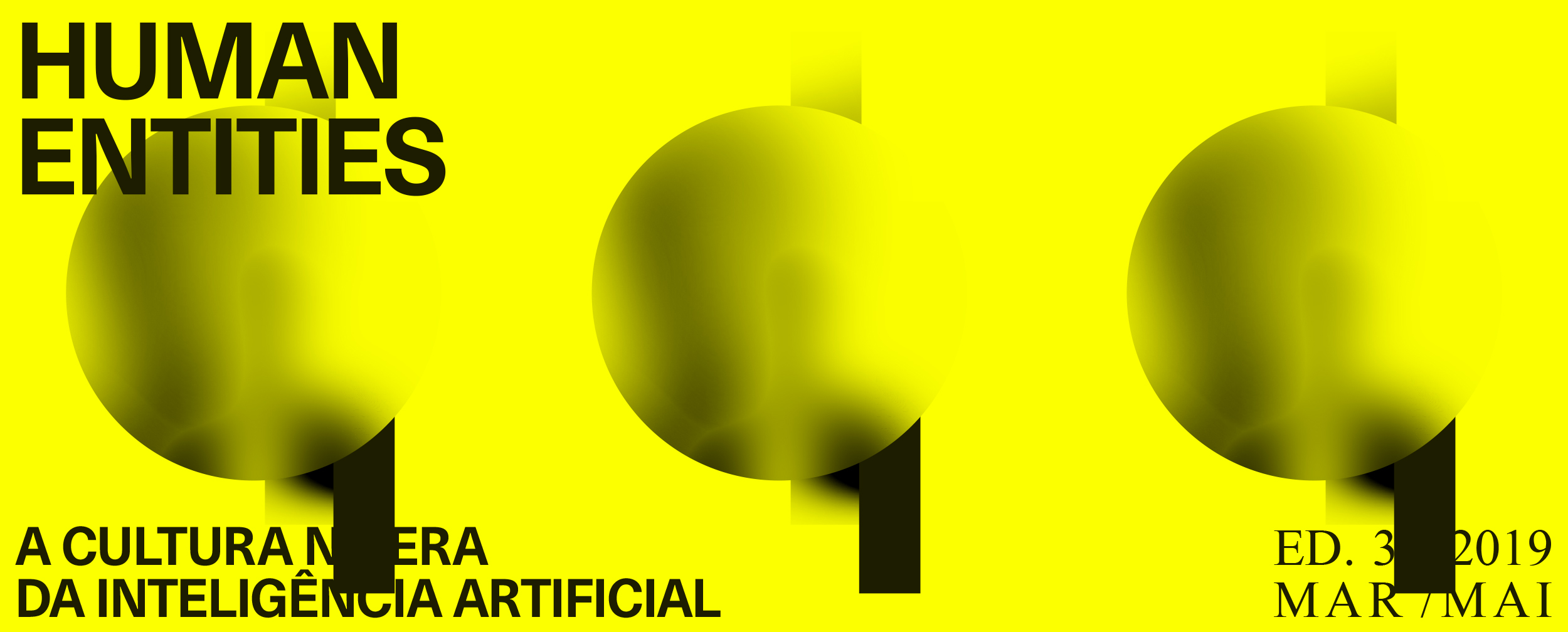
Human Entities 2019: a cultura na era da inteligência artificial
3ª edição
Programa de conversas, março – maio 2019
Organização CADA em parceria com a Trienal de Arquitectura de Lisboa
Entrada livre, mediante registo
[English below]
Sinopse
Poucas tecnologias estimulam tanto a imaginação como aquelas que tentam replicar a mente humana. Desde a Idade Média até à ficção científica moderna, muitos fantasiaram sobre a construção de máquinas vivas. E agora chegaram, de modo completamente diferente, sob a forma de inteligência artificial: como agentes de software, invisíveis, por detrás de um vasto espectro de tecnologias computacionais integradas na vida quotidiana.
Se até há pouco tempo a era digital podia ser simbolizada pelas redes sociais e vídeos de gatinhos, hoje há uma inquietação e uma sensação bastante tangível de que a inteligência artificial está a redefinir todos os aspectos da experiência vivida. Simultaneamente, a utilização destes poderosos sistemas é acompanhada por crescente desigualdade social, múltiplos escândalos da indústria e um reconhecimento cada vez maior de que estas tecnologias estão a minar a democracia, com possíveis consequências para a liberdade individual. Se este cenário beneficia as elites ou, pelo contrário, contribui para o bem público dependerá das escolhas políticas actuais.
Com o passar do tempo, e à medida que a pressão aumenta, a compreensão que as empresas têm da machine intelligence poderá alterar-se de modo a lidar com a complexidade do mundo real. Mas, se não aceitarmos que humanos e máquinas pensam de forma diferente, estamos a limitar as nossas hipóteses de compreender o verdadeiro potencial da inteligência artificial. Talvez o nosso maior ganho com a inteligência artificial seja justamente a possibilidade de nos ajudar a ultrapassar o desejo de replicar a mente humana, oferecendo-nos novas formas de pensar.
CADA – Sofia Oliveira/Jared Hawkey
Human Entities é um ciclo de conversas focado na mudança tecnológica e nos seus impactos – nas formas como a cultura e a tecnologia se influenciam mutuamente.
Quarta, 20 de março 2019, 18.30–20.30
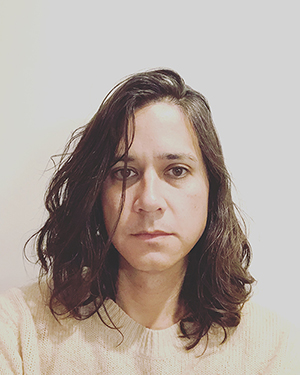
California Capture: Como a West Coast transforma o Mistério em Infraestrutura
Kenric McDowell
Diretor Artists + Machine Intelligence, Google Arts & Culture
O machine learning e a inteligência artificial estão a entrar nas nossas vidas quotidianas. Ao mesmo tempo, a adopção tecnocrática da etnobotânica e da psicofarmacologia está preparada para alterar a nossa percepção coletiva da realidade. Será coincidência? Kenric McDowell apresenta a história do envolvimento contracultural de Silicon Valley com o desconhecido, explorando as implicações desses encontros na identidade, arquitectura e desenvolvimento tecnológico global.
Kenric McDowell
Natural de Napa, Califórnia, e a viver em Topanga, Califórnia, Kenric McDowell trabalha há mais de vinte anos na intersecção entre cultura e tecnologia. Dirige o programa Artist + Machine Intelligence na Google Arts & Culture, onde facilita a colaboração entre investigadores de inteligência artificial, artistas e instituições culturais. Kenric McDowell é um conferencista regular, consultor em think tanks e organizações artísticas, ajudando grupos a ligar a prática artística e produção tecnológica a tradições mais amplas da compreensão humana.
Links:
https://ami.withgoogle.com
https://medium.com/@KenricMcDowell
https://twitter.com/kenricmcdowell
A conversa com o Kenric será seguida de uma Q&A moderada por dr Bakali
Nota: Devido a uma falha técnica não foi possível recuperar a gravação desta conversa.
Quarta, 27 de março 2019, 18.30–20.30
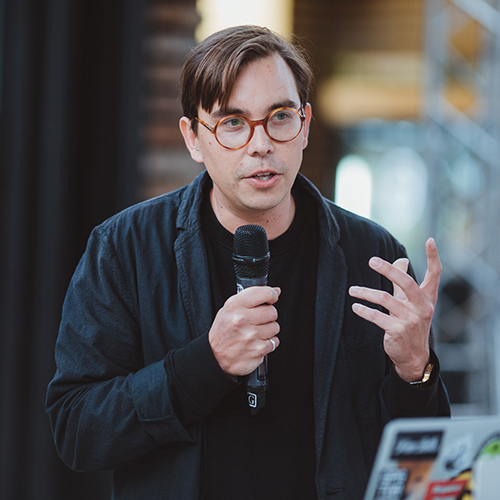
Outras inteligências
James Bridle
Artista e escritor
Passámos as últimas centenas de anos a tentar dominar o mundo com matemática, cálculo, física e tecnologias digitais. Fomos levados a acreditar que o mundo pode ser reduzido a dados – que só os dados interessam. Mas, no entanto, o mundo transborda de vida e os nossos algoritmos parecem incapazes de captar a sua complexidade – a nossa suposta visão lógica do mundo parece conduzir-nos ao medo, desconfiança e polarização, e o colapso cognitivo aparece espelhado no colapso ecológico. Como é que uma diferente compreensão do papel que a tecnologia desempenha no mundo mudaria a nossa relação com o próprio mundo? O artista e escritor James Bridle explorará as questões e possibilidades da inteligência artificial e de outras inteligências a partir do seu próprio trabalho, e de novas descobertas na ecologia, biologia e computação.
James Bridle
James Bridle é um artista e escritor que trabalha com um amplo leque de tecnologias e disciplinas. Os seus trabalhos já foram comissionados por galerias e instituições e exibidos pelo mundo e na internet. Os seus textos sobre literatura, cultura e redes já foram publicados em revistas e jornais incluindo Wired, Domus, Cabinet, the Atlantic, the New Statesman, the Guardian, the Observer, entre muitos outros. Fala regularmente em conferências, universidades e outros eventos. New Dark Age, o seu livro sobre tecnologia, conhecimento e o fim do futuro foi publicado pela Verso (UK & US) em 2018.
Links:
https://jamesbridle.com
https://twitter.com/jamesbridle
New Dark Age: Technology and the End of the Future
A conversa será seguida de uma sessão de Q&A.
Quarta, 17 de abril 2019, 18.30–20.30
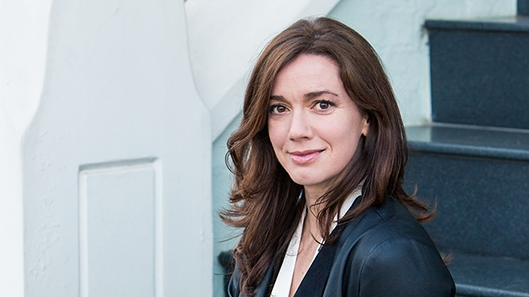
Fazer face à biométrica
Stephanie Hare
Investigadora e jornalista
As nossas caras, vozes, ADN, impressões digitais e outros dados sobre os nossos corpos (os nossos dados biométricos) cada vez mais são utilizados por governos e empresas para nos identificar e monitorizar, bem como para analisar, prever e controlar os nossos comportamentos. Isto põe de tal forma em risco a nossa privacidade, as nossas liberdades civis e as nossas democracias que até os gigantes da tecnologia como a Google, a Microsoft e a Amazon estão a pedir regulação. Que papel queremos (se é que queremos) que as tecnologias biométricas desempenhem nas nossas sociedades? De que modo transformarão a vida pública e privada? Poderá a legislação evitar os piores cenários?
Stephanie Hare
Stephanie Hare é uma investigadora focada em tecnologia, política e história. Seleccionada pelos programas FPI e BBC Expert Women, partilha as suas perspectivas na televisão e na rádio e tem escrito para a Harvard Business Review, Financial Times, Project Syndicate, Herald, CNN e Guardian. Anteriormente, foi diretora na Accenture Research, estratega na Palantir, analista senior na Oxford Analytica e consultora na Accenture. Foi bolseira em Oxford (Alistair Horne Visiting Fellowship no St Antony’s College), tendo feito mestrado e doutoramento na London School of Economics depois do bacharelato na Universidade do Illinois em Urbana-Champaign.
Links:
https://www.harebrain.co
https://twitter.com/hare_brain
A conversa será seguida de uma sessão de Q&A.
Quinta, 30 de maio 2019, 18.30–20.30 (Adiado)
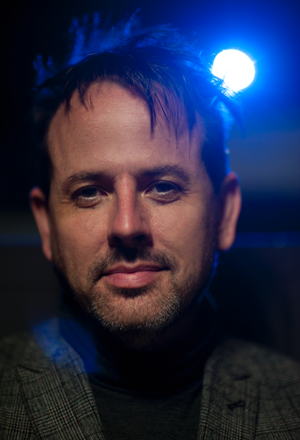
O Artificial: Planetário e Programação
Benjamin H. Bratton
Universidade da Califórnia, San Diego / Strelka Institute for Media, Architecture and Design, Moscovo
Esta conversa considera o modo como o realismo ecológico (incluindo o espectro do colapso) juntamente com a extensão da computação à escala planetária alteram a forma como concebemos “o artificial”.
Em causa está se devemos abraçar “o artificial” como a base de uma epistemologia técnica mais viável, materialismo prático e economia planetária e, se sim, como? Para tal, é útil pensar em termos de totalidades, sobretudo porque estas permitem a identificação em simultâneo, e para além de qualquer perspectiva situada, da agência, subjectividade, causalidade e efeito distribuídas.
Que “artificial”? É claro que não existe “natureza”. A própria ideia de que existe um absoluto fora da cultura está desacreditada, embora persista e, no entanto, o inverso é ainda mais difícil de engolir. Se não existe natureza, então também não existe cultura. Há química, abstração e mudança de fase, padrão e depois colapso, para além de outras coisas.
Que “planetário”? Apesar da integridade da nossa integração mútua, o planetário não pode ser imaginado em oposição à pluralidade, sobretudo quando este último termo está sobre-associado ao local, ao vernacular e a experiências únicas dos passados históricos.
Isto é, mesmo que olhemos para trás, para histórias dissemelhantes que também configuram as nossas relações atuais, iremos ainda assim habitar futuros conjuntos.
Esse vínculo inclui uma futuridade “universal”, pelo menos de um certo tipo. Não é, no entanto, formulado por idiomas locais nem por uma colagem de pontos de vista de tradições e perspetivas reificadas, mas antes pela difícil coordenação de um interior planetário comum.
Ou seja, não é que a computação à escala planetária tenha trazido o desaparecimento do exterior; ajudou a relevar – de novo – que, para começar, nunca houve nenhum exterior.
Benjamin H. Bratton
Universidade da Califórnia, San Diego / Strelka Institute for Media, Architecture and Design, Moscovo
O trabalho de Bratton abrange Filosofia, Arte, Design e Ciência Computacional. É professor de Artes Visuais e director do Centro para Design e Geopolítica, Universidade da Califórnia. Diretor do programa em Media, Arquitectura e Design do Instituto Strelka em Moscovo, professor de Digital Design na European Graduate School e Visiting Professor na SCIArc, California Institute of Architecture.
No seu livro The Stack (MIT Press, 2015), Bratton desenha uma nova teoria para a era da computação global e governância algorítmica. Nesta propõe que os diferentes géneros de computação à escala planetária – smart grids, plataformas de clouds, aplicações móveis, cidades inteligentes, a Internet das Coisas, automação – podem ser entendidas não como espécies distintas a evoluir sozinhas, mas formando um todo coerente: uma megaestrutura acidental que é ao mesmo tempo infraestrutura computacional e uma nova arquitectura de governância. O livro traça um expansivo e interdisciplinar briefing de design para The Stack-to-Come.
Links:
http://bratton.info
http://thestack.org
https://twitter.com/bratton
A conversa será seguida de uma sessão de Q&A.
ENGLISH
Human Entities 2019: culture in the age of artificial intelligence
Third edition
Series of public talks, March – May 2019
Organised by CADA in partnership with the Lisbon Architecture Triennale
All welcome, free admission; booking required
Talks in English
Overview
Few technologies capture the imagination like those that attempt to replicate human minds. From the Middle Ages to the science fiction of modern times people have fantasised about building living machines. And now in the form of artificial intelligence they’ve arrived, even if that’s in an entirely new projection: as software agents sitting invisibly behind a wide range of computational technologies woven into daily life.
Whereas only a few years ago the digital shift could be summarised by social media and videos of cats, there’s now a tangible and uneasy feeling that AI will redefine every facet of lived experience. At the same time, the deployment of these powerful systems is accompanied by rising inequality, industry scandals and a growing recognition that these technologies are undermining democracy with potential impacts on individual freedom. Whether or not this scenario will in the future benefit the elite or work for the public good depends on current political choices.
Over time, as pressure builds, today’s corporate vision of machine intelligence may improve to deal with the complexity of the real world. But unless we embrace the extent to which humans and machines think differently we will restrict our chances to capture AI’s full potential. Perhaps the real gain from artificial intelligence will be to help us move beyond the desire to replicate human minds and offer us new ways to think.
CADA – Sofia Oliveira/Jared Hawkey
Human Entities is a series of talks focused on technological change and its impacts – the ways culture and technology shape and influence each other.
Wednesday 20 March 2019, 18.30–20.30

California Capture: How the West Coast turns Mystery into Infrastructure
Kenric McDowell
Lead at Artists + Machine Intelligence at Google Arts and Culture
Machine learning and artificial intelligence are entering our everyday lives. Simultaneously, the technocratic embrace of ethnobotany and psychopharmacology is poised to change our collective perception of reality. Is this a coincidence? Kenric McDowell presents Silicon Valley’s history of countercultural engagement with the unknown to explore the implications of such encounters for identity, architecture, and global technological development.
Kenric McDowell
Born in Napa, California and based in Topanga, California, Kenric McDowell has worked at the intersection of culture and technology for over twenty years. Kenric leads the Artist + Machine Intelligence program at Google Arts & Culture, where he facilitates collaboration between artificial intelligence researchers, artists, and cultural institutions. Kenric is a regular conference speaker and consultant to think tanks and arts organizations, helping groups connect artistic practice and technology production with larger traditions of human understanding.
Links:
https://ami.withgoogle.com
https://medium.com/@KenricMcDowell
https://twitter.com/kenricmcdowell
Kenric’s talk will be followed by a Q&A session moderated by dr Bakali
Note: Due to a technical failure it was not possible to recover the recording of this conversation.
Wednesday 27 March 2019, 18.30–20.30

Other Intelligences
James Bridle
Artist and writer
We have spent the last hundred years attempting to master the world with calculation, with mathematics, physics, and digital technologies. We have come to believe that the world can be reduced to data – and only data matters. And yet the world still teems with life and our algorithms seem incapable of capturing its complexities; our supposedly logical worldview seems to lead us to fear, distrust, and polarisation, and the cognitive collapse is mirrored in an ecological one. How might a different understanding of the role technology plays in the world change our relationship with the world itself? Artist and writer James Bridle will explore the questions and possibilities of artificial and other intelligences through his own work, and new discoveries in ecology, biology, and computation.
James Bridle
James Bridle is an artist and writer working across technologies and disciplines. His artworks have been commissioned by galleries and institutions and exhibited worldwide and on the internet. His writing on literature, culture and networks has appeared in magazines and newspapers including Wired, Domus, Cabinet, the Atlantic, the New Statesman, the Guardian, the Observer and many others, in print and online. He lectures regularly at conferences, universities, and other events. “New Dark Age”, his book about technology, knowledge, and the end of the future, was published by Verso (UK & US) in 2018.
Links:
https://jamesbridle.com
https://twitter.com/jamesbridle
New Dark Age: Technology and the End of the Future
The talk will be followed by a Q&A session.
Wednesday 17 April 2019, 18.30–20.30

Facing Up to Biometrics
Stephanie Hare
Researcher and broadcaster
Our face, voice, DNA, fingerprints and other data about our bodies (also known as our biometrics) are increasingly being used by governments and companies to identify and monitor us, and to analyse, predict and control our behaviour. The risk to our privacy, our civil liberties and our democracies is so grave that even technology giants such as Google, Microsoft, Amazon are asking for regulation. What role – if any – do we want biometrics technologies to play in our society? How would they transform private and public life? Can regulation prevent the worst-case scenarios?
Stephanie Hare
Stephanie Hare is a researcher focused on technology, politics and history. Selected for the Foreign Policy Interrupted fellowship and the BBC Expert Women programme, she shares insights on television and radio and has published in the Harvard Business Review, the Financial Times, Project Syndicate, the Herald, CNN and the Guardian. Previously she has worked as a principal director at Accenture Research, a strategist at Palantir, a senior analyst at Oxford Analytica, and a consultant at Accenture. She has held the Alistair Horne Visiting Fellowship at St Antony’s College, Oxford, has a PhD and MSc from the London School of Economics and a BA from the University of Illinois at Urbana-Champaign.
Links:
https://www.harebrain.co
https://twitter.com/hare_brain
The talk will be followed by a Q&A session.
Thursday 30 May 2019, 18.30–20.30 (Postponed)

The Artificial: Planetary and Programming
Benjamin H. Bratton
University of California, San Diego / Strelka Institute for Media, Architecture and Design, Moscow
This talk will consider how ecological realism (including the specter of collapse) and the scope of planetary-scale computation together alter how we conceive of “the artificial.”
At stake is whether we should embrace “the artificial” as the basis of a more viable technical epistemology, practical materialism and planetary economics, and if so, how so? For this, it is useful to think in terms of totalities not least because they invite the tracing of distributed agency, subjectivity, causality and effect, all at once and beyond any one situated perspective.
Which “artificial?” There is no “nature” of course. The very idea of an absolute outside of culture is discredited but persistent, yet the inverse is even harder to swallow. If there is no nature, there is also no culture. There is chemistry, abstraction and phase change, pattern and then collapse, and other things besides
What “planetarity?” Despite the integrity of our mutual integration, planetarity cannot be imagined in opposition to plurality, especially as the latter term is now over-associated with the local, the vernacular, and with unique experiences of historical pasts.
That is, even as we look back on dissimilar histories that also set our current relations, we will nevertheless inhabit conjoined futures.
That binding includes a “universal” futurity, at least of a kind. It is, however, not one formulated by local idioms nor by a viewpoint collage of reified traditions and perspectives, but rather by the difficult coordination of a common planetary interior.
That is, it is not that planetary-scale computation brought the disappearance of the outside; it helped reveal —again—that there never was an outside to begin with.
Benjamin H. Bratton
University of California, San Diego / Strelka Institute for Media, Architecture and Design, Moscow
Benjamin H. Bratton’s work spans Philosophy, Art, Design and Computer Science. He is Professor of Visual Arts and Director of the Center for Design and Geopolitics at the University of California, San Diego. He is Program Director of The New Normal programme at Strelka Institute of Media, Architecture and Design in Moscow. He is also a Professor of Digital Design at The European Graduate School and Visiting Faculty at SCI_Arc (The Southern California Institute of Architecture).
In The Stack: On Software and Sovereignty (MIT Press, 2016. 503 pages) Bratton outlines a new theory for the age of global computation and algorithmic governance. He proposes that different genres of planetary scale computation — smart grids, cloud platforms, mobile apps, smart cities, the Internet of Things, automation — can be seen not as so many species evolving on their own, but as forming a coherent whole: an accidental megastructure that is both a computational infrastructure and a new governing architecture. The book plots an expansive interdisciplinary design brief for The Stack-to-Come.
Links:
http://bratton.info
http://thestack.org
https://twitter.com/bratton
The talk will be followed by a Q&A session.
Local: Trienal de Arquitectura de Lisboa, Campo de Santa Clara, 142-145, 1100-474, Lisboa
Venue: Lisbon Architecture Triennale, Campo de Santa Clara, 142-145, 1100-474 Lisbon, Portugal
Organização CADA em parceria com a Trienal de Arquitectura de Lisboa
Organised by CADA in partnership with the Lisbon Architecture Triennale
Financiamento/Funded by: República Portuguesa – Cultura | Direção-Geral das Artes
Apoio/Supported by: Câmara Municipal de Lisboa, NOVA LINCS e/and ISCTE-IUL
Graphic design: Marco Balesteros (LETRA)

